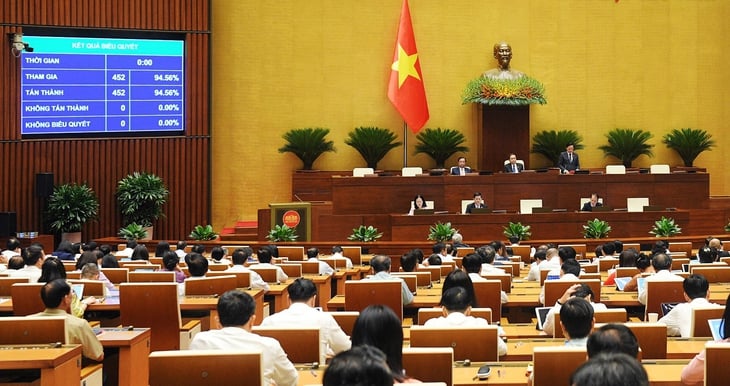
Scene of a National Assembly meeting - Photo: GIA HAN
During the meeting on June 4, when the National Assembly Standing Committee discussed the draft Law amending and supplementing a number of articles of the Advertising Law, Minister of Culture, Sports and Tourism Nguyen Van Hung commented that National Assembly deputies wearing shirts with brand logos printed on them is not considered advertising.
According to him, only when there are commercial elements, contracts and specific material benefits, does that behavior fall within the legal definition of advertising.
Reader Minh Huy sent Tuoi Tre Online an article providing additional perspectives on this issue.
Personal freedom and public responsibility of National Assembly deputies
No one can deny that choosing clothes is part of personal freedom, reflecting one's own style and personality.
However, when National Assembly deputies enter the parliament - considered the "common home" of the people, where important decisions are made - every action, including clothing, has symbolic meaning.
The image of the deputies not only represents them as individuals, but also reflects the prestige and dignity of the legislative body.
Wearing shirts with brand logos, even if not for commercial purposes, can unintentionally cause misunderstandings among the public. Voters, who place their trust in their representatives, may question the relationship between the representative and the business associated with the brand.
So how to preserve personal freedom while still protecting the objective and honest image of elected representatives?
According to Article 2 of the 2012 Law on Advertising (amended and supplemented in 2018), advertising is defined as the use of means to introduce to the public products, goods, and services for profit purposes, products, and services not for profit purposes, or organizations and individuals trading in the introduced products, goods, and services, except for news, social policies, and personal information.
Based on the opinion of Minister Nguyen Van Hung, if a delegate does not receive remuneration, does not sign an advertising contract, or does not have any material benefits associated with wearing a shirt with a logo, this behavior does not violate advertising laws.
This is a strong argument, based on current legal basis.
However, beyond the legal scope, the issue also involves public ethics - an important aspect of the role of National Assembly deputies.
Chairman of the Delegation Work Committee Nguyen Thanh Hai expressed his concerns and proposed that specific regulations be needed to avoid misunderstandings about representative interests.
In fact, appearing in branded clothing, whether intentional or not, can raise public concerns about potential conflicts of interest, even in the absence of commercial evidence.
This requires delegates not only to comply with the law but also to have a deep awareness of standards of conduct in order to maintain the trust of voters.
Parliament is not only a place for policy debate, but also a symbol of dignity and neutrality. The way deputies dress can help shape the image of the legislature in the eyes of the people.
Furthermore, even without an endorsement deal, frequent appearances with the same particular brand can raise unnecessary speculation about the representative's relationship with that business.
Need a specific code of conduct?
While clothing is not directly a prohibited element, the choice of commercially iconic clothing can be viewed through this lens.
A positive approach is to encourage delegates to prefer neutral, nationally symbolic or simple attire, to honour their representative role and avoid unnecessary controversy.
Many countries in Southeast Asia and Asia have established specific regulations or practices on parliamentarians' attire, both to ensure solemnity and to avoid conflicts of interest.
The Thai Parliament encourages MPs to wear traditional costumes such as Thai shirts or monochrome suits during official sessions, to honor local culture and minimize the possibility of commercial elements appearing on the outfit.
The Singapore Parliament requires MPs to wear suits or formal business attire during sessions, and encourages them to avoid wearing accessories or branded clothing to maintain a professional image and avoid any misunderstandings about personal interests.
Japanese lawmakers typically wear traditional suits or kimonos, and there are informal guidelines that encourage avoiding commercial attire to protect neutrality.
From these experiences, we can consider building a specific code of conduct for National Assembly deputies, which stipulates appropriate attire, prioritizing neutral options or options that are symbolic of Vietnamese culture.
This is not intended to restrict individual freedom but rather as a way for delegates to demonstrate greater responsibility for their roles.
National costumes: Cultural highlights in parliament
In fact, in the parliament, many National Assembly deputies have chosen to wear traditional costumes of their ethnic groups, such as the Mong, Dao, Ede ethnic minorities...
These costumes not only create a positive image for the community they represent but also highlight the cultural diversity of Vietnam - a country proud of 54 ethnic groups.
For example, the image of delegates wearing traditional Ede dresses or the typical Pieu scarves of the Thai ethnic group brought the breath of the remote highlands to the parliament, helping people feel the closeness and true representation from the delegates.
These costumes have contributed to creating a rich and vibrant cultural picture in parliament, and so they should be encouraged as a way to honor traditional values and diversity.
Source: https://tuoitre.vn/national-congress-delegates-wear-shirts-with-logo-khong-gan-loi-ich-vat-chat-khong-phai-la-quang-cao-nhung-20250605101251062.htm









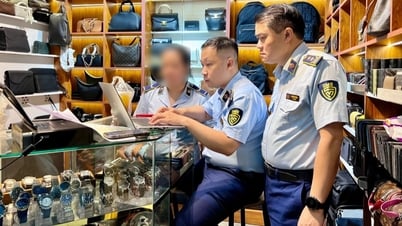




































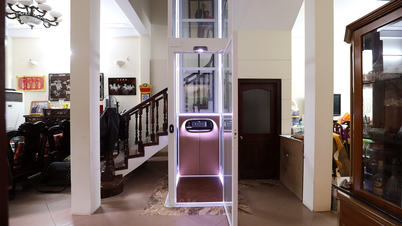





















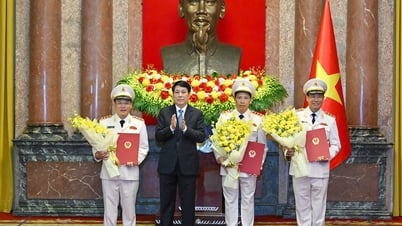





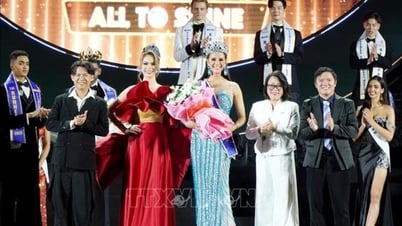






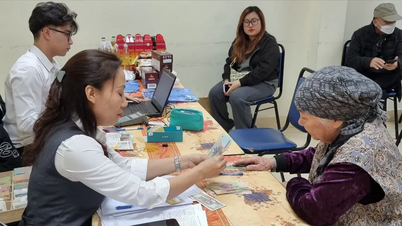













Comment (0)